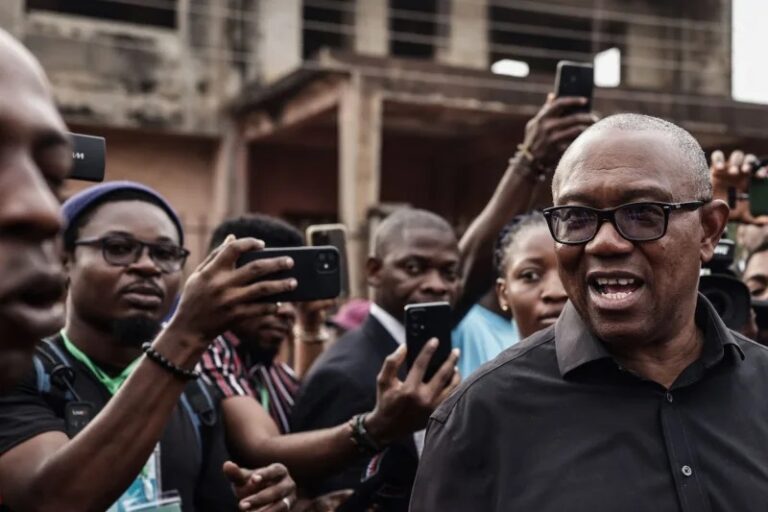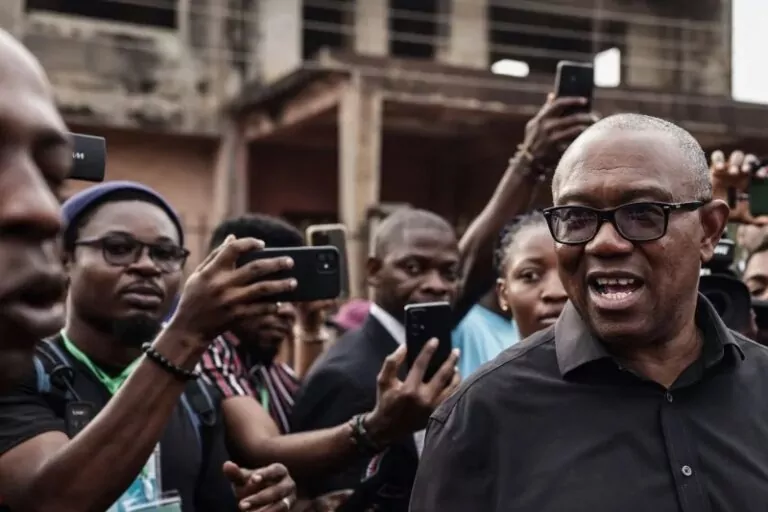

as the legal challenge to the nigerian election results begins, protesters storm the court.
On Monday, a large group of demonstrators stormed the appeal court in Abuja, Nigeria’s capital city, to voice their displeasure with the election results. However, they were prevented from entering the court by security personnel who were present at the scene.
Orngu Angwu, the head of the demonstration, is quoted as saying, “We are here calling on the judiciary to give justice to Nigerians.” Many Nigerians had high hopes that the presidential election would usher in much-needed change at a time when the nation is struggling with widespread insecurity, economic difficulties, and rising levels of poverty; yet, many were let down by the manner in which the election was carried out.
The trial of opposition leaders who are contesting the results of the election that took place in February and were won by the ruling party began with a pre-hearing session on Monday before a panel of five Nigerian judges. Since Nigeria returned to democracy in 1999 after three decades of military rule, elections have always ended up in court, despite the fact that no challenge has ever been successful in overturning the results of an election.
In March, numerous presidential candidates, including the main opposition leader Atiku Abubakar, who came in second place, and outsider Peter Obi, who came in third place, filed petitions contesting the win of Bola Tinubu. After the petitions have been submitted, the court has a time limit of one hundred eighty days to render a ruling, which can then be appealed to the highest court.
On Monday, it was not anticipated that any significant decision would be made. In his appeal, Abubakar, who was running for president for the sixth time at the time, claimed that he had won the poll that took place on February 25. He and Obi both claimed that the Independent National Electoral Commission’s (INEC) announced results were invalid because of “corrupt practices” and “non-compliance” with electoral laws.
Abubakar, widely known as “Atiku” in Nigeria, asserted in his petition of 223 pages that Tinubu did not meet the statutory requirement of 25 percent of votes in the Federal Capital Territory. His plea was titled “Atiku.” Obi, who had garnered widespread support among the younger generation in Nigeria, stated in his own petition that he was the victor in the election.
In a petition that was one hundred pages long, he also asserted that Tinubu was “not qualified to contest” because of his alleged involvement in a drug-related case in the United States. The newly elected president has denied any misconduct during his time spent residing in the United States, and both he and his party have rejected charges from the opposition that electoral fraud occurred, making an appeal for unity.
The Independent National Electoral Commission (INEC) has acknowledged that there were “glitches” during the vote in February, but it has rejected charges that the process was not free and fair. Tinubu, who will succeed Muhammadu Buhari when he has served two terms in office, is scheduled to take the oath of office on May 29, and it is unlikely that the ongoing legal struggle would prevent this from happening.
Many Nigerians had high hopes that the presidential election would usher in much-needed change at a time when the nation is struggling with widespread insecurity, economic difficulties, and rising levels of poverty; yet, many were let down by the manner in which the election was carried out.
US Secretary of State Marco Rubio ordered South African Ambassador Ebrahim Rasool to leave America by March 21 because he…
Early 2025 ends with IPL fever in India and cricket fans receive good news of an international schedule full of…
National teams from Africa advance their World Cup qualification pursuit as they take part in Matchday 5 of the qualifiers.…
Creative Africa Nexus (CANEX) is running the Book Factory Prize for Publishing in Africa again to award $28,000 to African…
Canadian companies have expanded their presence as major African mining stakeholders and invested more than $37 billion. Africa holds the…
The South African government wants people to plant one million trees across the nation within a single day on September…
This website uses cookies.